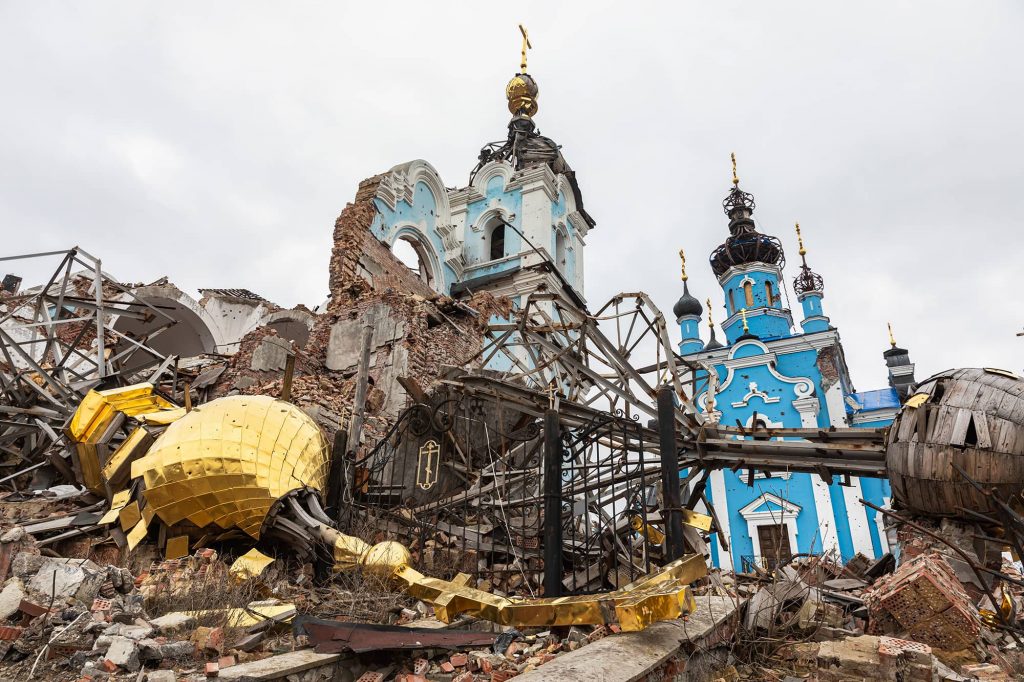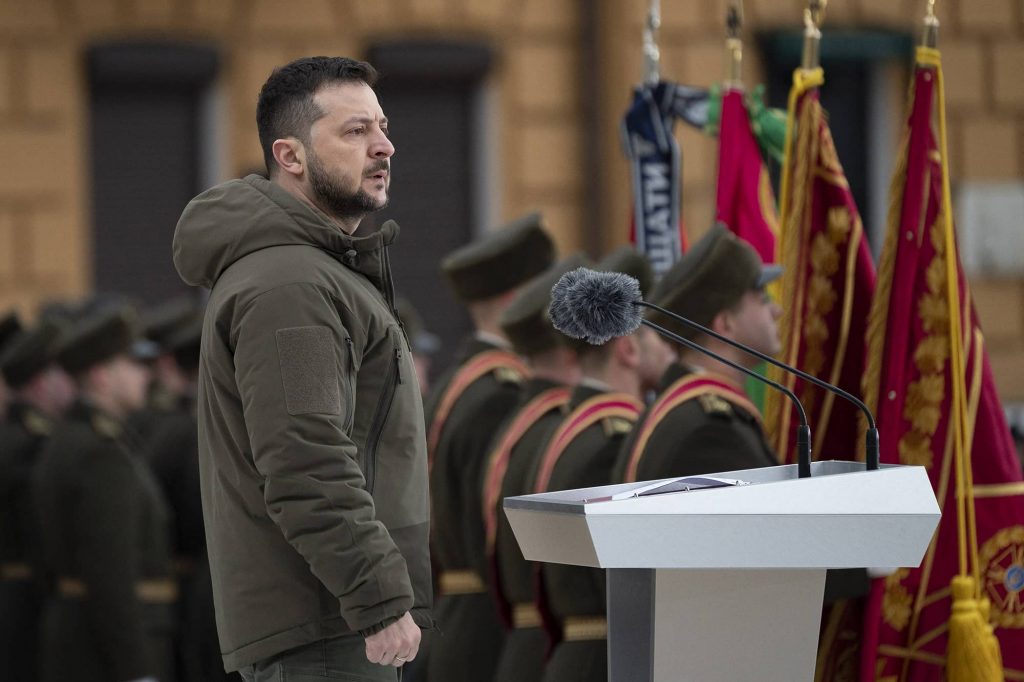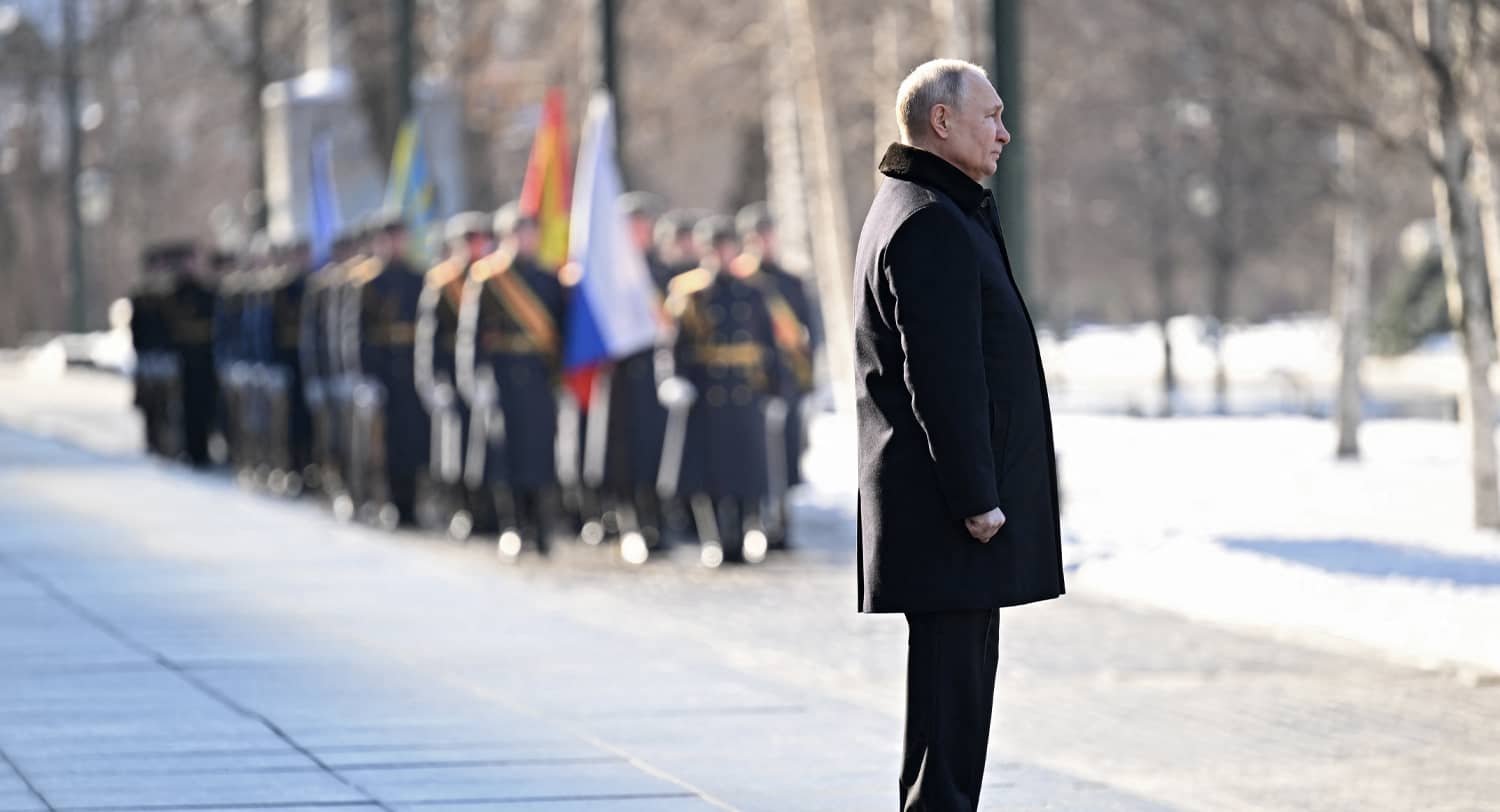A year after invading Ukraine, Vladimir Putin defines the war as an existential battle for Russia’s survival. In a classic case of the aggressor blaming the victim, Putin says the West invaded Russia using Ukraine. “It’s they [the West] who have started the war. And we are using force to end it,” he said on February 21 in his address to Russia’s Federal Assembly. “The people of Ukraine have become hostages of the Kyiv regime and its Western handlers . . . Over the long centuries of colonialism, diktat and hegemony, they [the West] got used to being allowed everything.”
For years, Western leaders accommodated Putin and dismissed suggestions that in a non-conventional sense, he was already at war with them. It took an invasion the scale of which Europe has not seen since World War II to hear this message. President Biden and other Western leaders continue to pledge to support Ukraine for as long as it takes in what they anticipate to be a long war. Yet if the war goes on for years, the Ukrainians will be at a disadvantage, despite their courage and resolve.
Current State of Play
Western observers have focused largely on the Russia’s inability to conduct modern warfare. But despite coordination and overall competence problems, the Russian military has inflicted severe damage on Ukraine—and Ukraine is no peripheral country; it is the largest country that lies entirely within European continent, approximately the size of Texas. Russia now controls approximately 17% of Ukraine’s territory, about 10% more than it did at the start of the invasion.
Ukraine has suffered approximately 100,000 casualties, while the country’s economy shrank by a staggering 30%. According to the United Nations High Commissioner for Refugees, over 8 million refugees from Ukraine registered in Europe for temporary protection—approximately a fifth of Ukraine’s pre-invasion population of 44 million. Over 13 million people, more than a fourth of Ukraine’s population, have also become internally displaced within Ukraine.
According to Ukraine’s President Volodymyr Zelenskyy, Russia has damaged approximately 40% of Ukraine’s infrastructure. Ukraine remains entirely reliant on Western aid, not only for military assistance but also for subsidies, for example to pay salaries. As Graham Allison, a professor of government at the Harvard Kennedy School has summarized, if the second year of the war goes on as the first year did, Russia will control almost one-third of Ukraine by February 2024.

Russia meanwhile has reportedly suffered approximately 200,000 casualties, twice as many as Ukraine, but its army is also several times larger. Russia’s economy contracted far less than many predicted, by 2.1%, and it has not suffered any damage to its infrastructure. To be sure, Russia lost many more people outside the battlefield. Over 3.8 million Russian citizens left the country in the first three months of 2022 alone, according to data from Russia’s Federal Security Service (FSB), as reported by The Moscow Times. A further 700,000 have reportedly fled after September 2022, when Putin announced partial mobilization.
If these numbers are accurate, approximately the same number of Russians, if not more, have left the country since the invasion of Ukraine than the estimated four-to-five million during the two decades of Putin’s rule. Still, Russia remains a country of roughly 140 million inhabitants, and Putin remains committed to the war no matter how high the costs are. Unlike Ukraine, Russia’s military has suffered from poor morale. Still, the majority of Russians support the actions of the Russian military in Ukraine, according to polls by the Levada Center. This Center remains Russia’s most trustworthy pollster.
The extent of the Russian public’s support remains a matter of debate, as does any polling in an authoritarian country, and, to be sure, Russians are no longer displaying the euphoria of post-Crimea annexation. But it is difficult to get around the fact that the war has not caused the massive domestic backlash that some in the West expected, and fear of state retribution alone does not account for this complacency. Recent evidence even suggests that Russia’s losses—to the limited extent that Russian citizens are aware of them—are only increasing support for the war, at least in the short-to-medium term.
Russia and the Global South
It has become common in the West to talk about Russia’s isolation, but Russia is primarily isolated by the free world. The global south, already disgruntled with the liberal world order, is not actively supporting the West and Ukraine, and the majority of the world’s countries did not join Western sanctions against Russia. As The Economist documented, a shadow economy of energy shipping and financing infrastructure—which includes the Gulf, China, and India—is “robust and extensive.” This situation is a major contributing factor to Russia’s continued ability to finance the war and prevent severe contraction to Russia’s economy. Indeed, India, an emerging global economic power, has increased its imports from Russia, chiefly of Russia’s crude, by 400% in this fiscal year. Russia’s security and limited economic activity in Latin America is another reason why Russia keeps finding loopholes in sanctions.
Kishore Mahbubani, Singapore’s former permanent representative to the UN, explained recently in an article when speaking about the global South, that “in their heart of hearts, many leaders of these countries do not buy the ‘black-and-white’ story that the West is selling on the conflict: Ukraine and the West are completely virtuous; Russia is completely evil.” To further support his point, he quotes South Africa’s President Cyril Ramaphosa, who said that, “the war could have been avoided if NATO had heeded the warnings from amongst its own leaders and officials over the years of that its eastward expansion would lead to greater, not less, instability in the region.” In other words, South Africa’s president leans closely toward the Kremlin’s narrative.
Russia continues to strengthen ties with Iran and China, while Russia’s overall strategic position in the Middle East and cooperation with Latin America, including disinformation campaigns in both regions, adds to Moscow’s ability to project its narrative in these regions. Some might say that Putin’s invasion has rallied and brought the West together. But this assertion—and its durability—will continue to be challenged as long as the Middle East and other parts of the global South remain at best fence sitters who do not see the global dimension of the war that the West sees.

Conclusion
It has become common in the US to proclaim over the last year that Ukraine will win and Russia has already lost. But neither has yet come to pass and much remains uncertain. The West deserves credit for coming together and supporting Ukraine. Yet after spending over $120 billion in assistance, the West (mainly the US) has yet to articulate clear goals on which all can agree. For example, what would a victory look like? Ukrainians themselves have suggested it would mean their country emerging as a strong democracy with a functioning economy, but the West has yet to put forth a clear vision of how to reach a victory for Ukraine and a loss for Russia.
More specifically, the West to date has made sure that Ukraine will not lose, but that is not the same thing as helping Ukraine win. The longer the war continues, the more resources Ukraine will need. Putin’s strategy remains focused on outlasting Ukrainian troop reserves. He has more resources to bring to bear, especially since he is not isolated globally, and he does not care how many people he loses to achieve his aims. He remains committed to sowing doubt in the West about the capabilities of Ukrainians and overall disunity about Ukraine.
Time is of the essence when it comes to helping Ukraine. The West (again, mainly the US) has followed a pattern of (a) delaying the supply of the types of weaponry that Ukrainians have asked for out of fear of escalation with Russia, and (b) supplying the weaponry anyway, once the Russians use that fear as an opportunity to escalate, changing the situation on the ground so that Ukraine requires the additional aid. Meanwhile, security assistance to Ukraine is likely to face more obstacles than in the past. American support for Ukraine remains strong both on Capitol Hill and among the general public, but questions remain as to the duration of the US commitment. It is no wonder Ukrainians push for an accelerated victory in the coming year rather than protracted warfare.
Putin alluded that his aspirations go beyond the peripheral parts of Ukraine already in his control. But even if there is a change in leadership in Russia, without achieving a complete victory on the battlefield, Moscow’s imperial impetus to control Ukraine will not vanish permanently. Yes, in many ways this is Putin’s war. But Russia’s wrestling with its own identity—and denial of Ukraine’s — is at the very founding of the Russian state.
For as long as Russia does not know where its borders end, global peace will remain undermined. Indeed, the invasion presented a challenge to the realist arguments we used to hear for Ukraine’s neutrality. Henry Kissinger, for one, now sees that this prescription has brought on the very war that he feared. Unfortunately, as the war goes into its second year, it remains unclear if the West as a whole has fully internalized the right lessons. Ukraine’s future—and with it the durability of the liberal world order—is uncertain.



